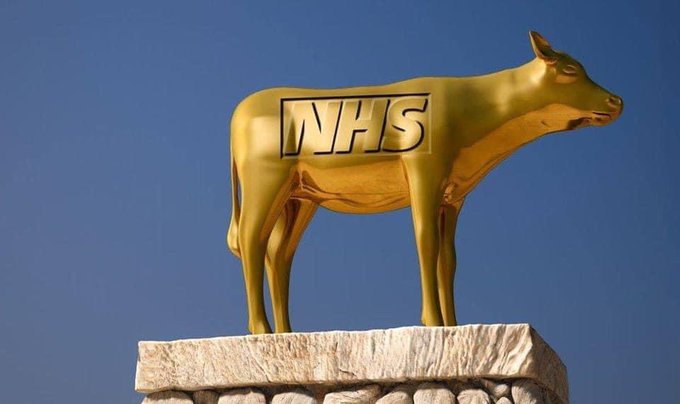Thanks to the government’s poor planning for a worldwide pandemic and a failure to see that it’s not just influenza that can be a respiratory disease of concern, Britain’s already piss poor National Health Service performed badly. The NHS is so badly run that the only way that it could just about cope with Covid was to turn the NHS into little more than a Covid only service. Regular treatments and surgery for patients in need were cancelled, access to General Practitioners was highly restricted and the entire country was lectured by the political classes about the importance of protecting the NHS.
The result of the NHS becoming a Covid only service is that waiting lists, already lengthy at 18 weeks when compared to the Dutch system where waiting times are about 7 weeks, got worse. For example we had to wait about three months from initial GP appointment (which was in itself hard to get) for a specialist appointment for our child to check out a digestive problem that he had. Part of that waiting time was we were told because the consultants didn’t want to schedule work in August.
Others have had it much worse than we have. People with worrying concerns about their health cannot get to be seen by a GP which may mean that conditions that may be treatable, if caught early, end up becoming much more serious if not lethal.
The waiting list for treatment in the UK has, because of the Covid situation and the general piss poor state of the NHS, which suffers from all the usual problems of a nationalised industry and then some, got to be absolutely ridiculous. At the present time, according to the Health Secretary Sajid Javid, there are now 5.9 million Britons on NHS waiting lists waiting for the healthcare that they’d paid for through their taxes. 5.9 million Britons represents 8.75% of the population of the United Kingdom. This is an enormous number of people to have waiting for healthcare.
Some will say that the way around this problem is to throw more money at the NHS. Sadly that’s not the way. You could thrown the whole nation’s gross domestic product at the NHS and it would still be shit. The issue is not how much it is funded, but instead it is the manner with which it is organised. The reason why we have a healthcare system that is centralised, politically dominated, wasteful, inflexible and one that treats its customers like crap, is primarily the fault of the NHS being state owned and run. No other nation has copied the NHS model when designing a comprehensive healthcare system for its people. They didn’t make that decision, a decision to choose a mixed system with various levels of public/private funding and a mix of public/private suppliers over the NHS model, because they envy the NHS, they made that decision because they could see just how bad the NHS is.
The NHS can in no way be considered a success when 8.75% of the UK’s population are waiting to be treated by this monstrously inefficient and disgraceful healthcare system. Clap for that? No bloody thanks.






“Is primarily the fault of the NHS being state owned and run”
I beg to differ in the sense that the fault lies with the internal management of the NHS of why the NHS has, and will continue to fail
I don’t believe that the NHS should be taken out of government hands because then it is at the mercy of being a business.
I have seen some businesses succeed at taking over government controlled departments but the majority of these businesses are tantamount to failure.
It is only right that people who need the NHS pay for it by as little means they have or the fact they can afford it.
There are so many that contribute nothing and expect to be given.
People need educating that their health matters but also their responsibility for themselves matter.
It’s about encouragement and motivation to ensure people understand that to live in a fair and just world, one must operate the same morals.
Other countries with a mixed system ie not one that is completely state controlled seem to do better with healthcare outcomes than the UK does. Ownership type does matter. With state owned industries you can get sclerotic services to customers. A good example is telecommunications. Back when BT was state owned and known as Post Office Telephones, we had a really bad system, with waits for telephone installation and such capacity issues that some people had to have ‘party lines’ where one phone line was shared with a neighbour. As soon as the telecoms system was privatised we had a proliferation of providers and service improved. There was no longer a ‘take or leave it it’s all you are getting attitude’ from telecoms providers and this is the same attitude that patients too often get from NHS staff.
Taking healthcare out of state control does not mean copying the dysfunctional American system. Other advanced nations manage to provide comprehensive and affordable healthcare of a better quality than that provided by the NHS. Some nations do this by a compulsory insurance system such as Israel or by having as some other nations do a mix of insurance and state funding of healthcare but the providers being a mixture of the state,private sector hospitals and even hospitals provided by charities and religious groups. Dumping the NHS does not mean going down the US route, we could take the German, French or Dutch options if we want. Such options are better than the US option but also better than the NHS one.
I agree that freeloaders are a problem with the NHS. Overseas freeloaders should pay but too often they get away with not paying. Like you I believe that people should take more responsibility and I’d also include in that allowing people to hold their own medical records or at least a key to access them. If people are to have more responsibility for their health then they also need choices and it’s choices that very few people get under the NHS.
The NHS killed my Mum with state sanctioned tick box medicine that did not see her as an individual, sadly I’m afraid that that experience has not only jaundiced my view of the NHS but has made me also see that what happened to my mother is a microcosm of what is wrong with the NHS system.
The NHS suffers from many of the ailments that other nationalised industries did, primarily a lack of need to bother about the satisfaction of the customer. I believe that healthcare should be paid for out of the common pot, a mixture of taxation and national insurance with people’s voluntary contribution via additional insurance to pay for extras. However its a massive conflict of interest for the State to pay for healthcare and also run it. I’d like to see some separation with the State paying the bills but a mixture of healthcare suppliers ranging from private providers, through municipal, charitable and religious order run entities to local health co-ops under democratic control. That way we would get a diversity of provision and maybe a better service for the customers.
Like you I’ve seen some utter disasters, mostly in IT, with contracting out but a lot of these problems were down to civil servants failing to properly specify what they wanted and making major changes part way through the installation.
So. The bottom line is why can’t the government run it properly?
If government are entrusted to run the country, why the hell are they not efficient enough to run a decent service for people’s welfare?
Surely that’s what they are there for?
Privatising important things that the public need only leads to greedy companies hiking prices.
Governments are just not that good at running big enterprises. This applies to the steel industry, motor manufacturing, telecoms and the NHS. Partly it’s because it’s one thing to run a government department and quite another to run an organisation that is much more dynamic and has end customers whether it’s a person buying steel a car a phone service or healthcare. Also state run enterprises end up being run not for the customer but for the employees and in particular the management. Over manning in management has been a feature of the NHS for decades, since at least the late 1960’s. When you appoint a manager to do job ‘a’ then that manager will want to appoint underlings which means you have a growth in the parasitical bureaucracy rather than front line staff. There’s a lot of unnecessary empire building by management in the NHS with massive amounts of associated waste and non essential work going on. Running an entity like a healthcare system is a different world from running a military or a police force where you have an acknowledged rank structure and often quite well defined goals. Healthcare is much more woolly than that, you have lots of different specialists, no real acknowledged rank structure and as many different goals and customers as there are people in the country. When dealing with diffuse customers and goals and lots of people with different specialities who might need to be brought in for different cases, the NHS just does not have the organisational agility that a private sector or co-op would have.
It’s in order to reduce management waste and the expenditure of public money on unnecessary fripperies like Diversity and Inclusion staff that I would like to see a separation between the funder and provider when it comes to healthcare. Ideally every person should have an individual health budget that they can spend as they wish at any hospital or GP that they wish to spend it on with emergency top up payments for those with complex and expensive conditions. The patient should be king when it comes to healthcare and we can’t get that with a healthcare system that is run all too much like British Leyland in the 1970’s.
Privatisation doesn’t always mean more expensive products or services. For example, we pay an awful lot less in inflation adjusted figures for telecoms for a far better service that we had fifty years ago. Doesn’t always work out like that and as with water and fuel yu can get a situation where the profits are privatised but the risks are public, but we need something better than the NHS. The NHS’s failures during the pandemic have highlighted the weaknesses inherent in a centrally controlled, overly bureaucratic, wasteful and often chaotic system subject to political interference.
Imagine the worst possible, lazy, couldn’t give a toss, do as little as you can, non customer focussed government department, for American readers who ask about the NHS I use their Department of Motor Vehicles as an analogy, and have that department run healthcare and that is what we get with the NHS. There are some brilliant clinicians working in the NHS but they are let down by the nature of the system they work in. I’ll tell you how awful the NHS is. When an elderly relative had an accident at home a few years back, he was taken to a major London teaching hospital for his wound to be stitched and his condition to be monitored. Because of previous experience with the NHS and the often awful way they treat the elderly, we could not trust the NHS to look after him humanely or properly, a family member had to be as close to the hospital as humanly possible for nearly a week. This was just so that someone could check on him regularly and how he was being cared for at unannounced and random times. We had to make sure that he was being seen by a doctor, that the nurses were not treating him like shit, that he wasn’t being forgotten, that he was being properly fed and watered that the clinicians were bothering to read notes about his medications and potential adverse reactions. We lived in terror of the NHS screwing up or behaving inhumanely. My family and the nation deserves a better healthcare system than that. I’ve known people with dual British / Dutch nationality who would rather go back to Holland for treatment rather than submit themselves to the NHS.
Ok. Thanks for the info. Acknowledged.